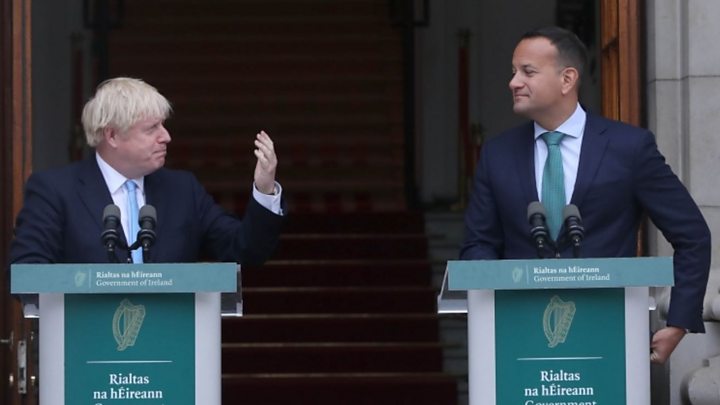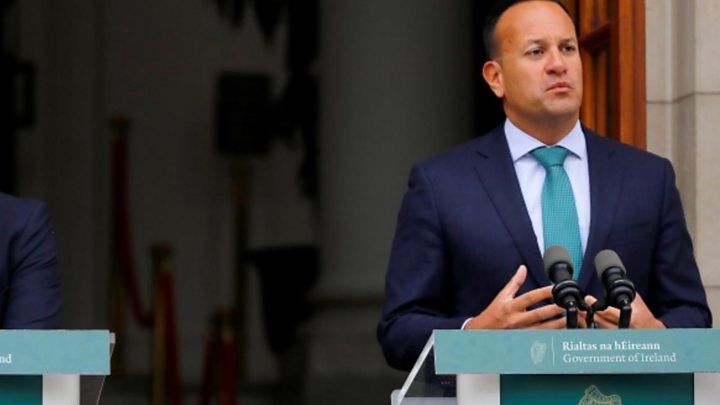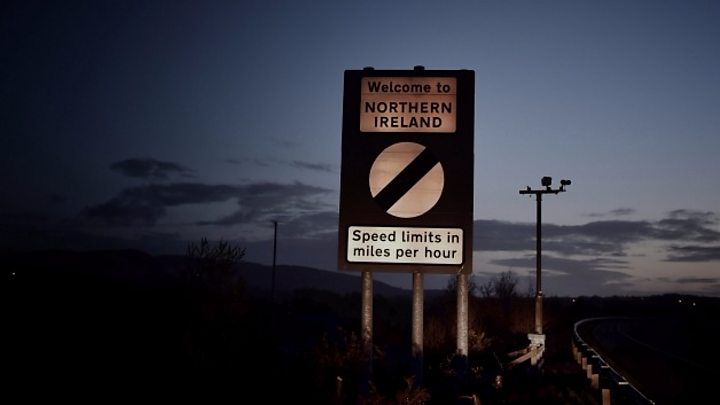
A no-deal Brexit would be a failure that both the British and Irish governments would be responsible for, Boris Johnson has said.
The prime minister was in Dublin for his first meeting with Irish PM Leo Varadkar since he entered Number 10.
The government has confirmed Parliament will be suspended later after a vote on holding an early general election.
Opposition parties will not back the vote, meaning there will be no election in October as the PM had hoped.
Mr Johnson said he believed a Brexit deal was still possible by the EU summit in October, but Taoiseach Varadkar said there was no such thing as a “clean break” between the UK and the EU.
- No-deal Brexit checks ‘needed near Irish border’
- Where might room for backstop compromise lie?
- Johnson and Brexit’s border problem
- MPs set to reject fresh call for early election
Mr Johnson has ruled out asking the EU to delay the Brexit deadline of 31 October, although the Irish government has said it would support another extension.

But Mr Johnson told reporters in Dublin he was “absolutely undaunted” about what might happen in Parliament.
The prime minister also said he had looked at the consequences of a no-deal Brexit, and “wanted to find a deal”.
What did the two PMs talk about?
The two leaders spoke privately for half an hour before joining their delegations for another half-hour meeting, said a joint statement.
“While they agreed that the discussions are at an early stage, common ground was established in some areas although significant gaps remain,” it added.
Is Varadkar Athena to Johnson’s Hercules?
“We must restore Stormont and we must come out [of the EU] on 31 October, or else permanent damage will be done in the UK to trust in our democratic system,” he added.
During their press conference, Mr Varadkar used a classical reference about his British counterpart that gained attention.
“Negotiating FTAs [free trade agreements] with the EU and US and securing their ratification in less than three years is going to be a Herculean task for you,” he said.
“We want to be your friend and ally, your Athena, in doing so.”
In Greek mythology, the goddess Athena did assist Hercules as an ally – but it was by knocking him out and stopping him from killing his family when he went mad.
Analysis: A change in tone?
By Jayne McCormack, BBC News NI Political Reporter
Boris Johnson arrived in Dublin trying to strike a more conciliatory tone than in previous weeks.
Perhaps brought to bear by cabinet ministers concerned about no deal, Mr Johnson insisted he wants an agreement.
But trust is a crucial tenet of any political relationship.
A stony-faced Leo Varadkar said a deal was still possible, but warned that promises from the UK wouldn’t cut it.
The Irish government is also watching Westminster closely, knowing the prime minister is currently boxed in by opposition parties, with few options left.
A breakthrough was never going to happen today, but what went on behind closed doors around this key meeting could pave the way for movement.
Why did the meeting take place?
The taoiseach invited Mr Johnson to Dublin two months ago, shortly after he was installed in Downing Street, to discuss Brexit.
The Irish government maintains that the backstop – the mechanism to avoid an Irish hard border – is needed in any withdrawal agreement, because of decisions made by the UK.
But Mr Johnson has said he will not sign up to a deal unless the backstop is removed, because it is “anti-democratic”.

There is also speculation that the government could propose returning to a backstop that would only apply to Northern Ireland, with the possibility of a role for the Stormont assembly before it could be triggered or new EU rules would take effect.
However, DUP leader Arlene Foster told the BBC she is convinced that Boris Johnson will not pursue the NI-only backstop.
She also said she was encouraged to hear both the British and Irish prime ministers “dialling down the rhetoric” and wanting to find a Brexit deal.
Are we heading for a general election?
Parliament will be suspended when business in the Commons finishes later on Monday, after MPs have voted again on whether to hold an early general election.
Before Parliament is prorogued, MPs will debate progress reports updating them on efforts to restore the Stormont assembly.
Unless power-sharing talks succeed before Brexit happens, Mr Smith has said direct rule powers from Westminster will need to be implemented at pace.
Northern Ireland’s devolved parliament collapsed in January 2017 when Sinn Féin’s Martin McGuinness resigned as deputy first minister, citing the DUP’s conduct around a flawed green energy scheme..
Meanwhile, legislation designed to delay a no-deal Brexit and force the prime minister to request an extension to the EU deadline received royal assent on Monday afternoon and has become law.
However, Mr Johnson has said he will not ask the EU for another extension, so it is unclear what might happen next.
The government will move another motion asking MPs to vote for a general election on Monday too, but it is unlikely to pass because opposition parties have agreed to reject the demand, saying Mr Johnson is trying to force through a no-deal exit.
What is the backstop?
The backstop is a key piece of the Brexit deal dictating what will happen to the border between Northern Ireland and the Republic of Ireland.
It is a last resort that guarantees a frictionless border if no better solution is devised in time – by maintaining close ties between the UK and the EU until such a solution is found.
Johnson tells Varadkar no-deal Brexit ‘would be a failure’


